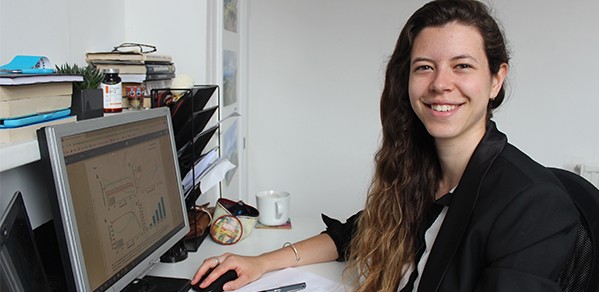
PhD student Poppy Oldroyd has been awarded an Industrial Fellowship to support her research into increasing the lifetime of brain implants treating epilepsy, Parkinson’s and depression.
This collaboration with the Royal Commission will ensure that my research is application and patient-led, which will increase the possibilities of producing a medical-grade device for clinical use.
PhD student Poppy Oldroyd
Poppy, who is part of the Department’s Bioelectronics Laboratory, was selected by the Royal Commission for the Exhibition of 1851 as one of its Industrial Fellows for 2020.
Poppy is working on a method for manufacturing polymer electrodes for interfacing with the brain on a large scale, using lithography and 3D printing. She is also investigating ways to increase the lifetime of the polymer-based electrodes, meaning fewer invasive operations for patients. This practice, known as neuromodulation – a technology that acts directly on nerves – is one that involves the delivery of electrical stimulation to a specific area of the brain.
Current methods of neuromodulation involve administering electrical stimulation using electrodes made from platinum and other metals, but these inorganic metals come with certain disadvantages, including low flexibility and low-efficiency stimulation, and cause fibrous scar tissue to form around the electrode, which diminishes its functionality.
Using organic polymers as the materials from which to build the electrodes offers a solution to some of these challenges, by reducing the mismatch in mechanical properties between the body and the electrode, diminishing scarring and increasing stimulation efficiency. Currently, there are no polymer devices being mass-produced for medical device companies, mainly because the manufacturing techniques needed to fabricate them are hard to scale up.
Poppy’s approach will involve researching potentially suitable polymers and nanoparticles and comparing different fabrication methods. She will be working with industrial partner Johnson Matthey, receiving technical supervision, as well as gaining access to the company's laboratories in Reading.
Commenting on her Industrial Fellowship, Poppy said: “I feel like I have been accepted into a family network of world-class researchers and experts whose common goal is to make a difference in the world. This collaboration with the Royal Commission will ensure that my research is application and patient-led, which will increase the possibilities of producing a medical-grade device for clinical use.”
Bernard Taylor, Chairman of the Royal Commission for the Exhibition of 1851, said: “Fostering British innovation with real commercial potential is more important than ever. Empowering bright scientists early in their career to do the research they want to pursue, while giving companies access to that research, is the best way of letting scientific curiosity impact industry. With research promising to unlock new products and revenue across the pharmaceutical, energy, defence and infrastructure industries, this year’s cohort demonstrates the potential and diversity of talent within British science.”
About Poppy Oldroyd
Poppy holds a masters degree in biomedical engineering with electrical engineering from Imperial College London. The focus of her work has been investigating conductive polymer electrodes for nerve regeneration.
She has a passion for giving back to the community and promotes STEM subjects to girls in secondary school.
Poppy was a previous Royal Commission undergraduate scholar through the Diamond Jubilee Scholarships in partnership with the Institute of Engineering and Technology (IET).
About the Industrial Fellowships
The Royal Commission for the Exhibition of 1851 Industrial Fellowships provide funding of up to £100,000 to cover salary contributions, university fees, and other costs to undertake doctoral studies and research.
Students’ projects are funded for up to three years, during which time they benefit from both academic and industrial support.

